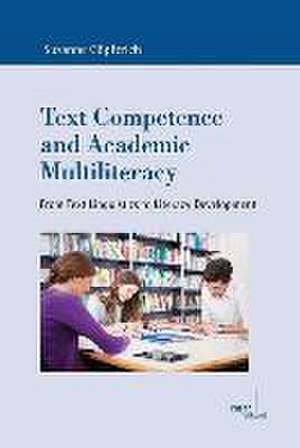Text Competence and Academic Multiliteracy: Europäische Studien zu Textlinguistik, cartea 16
Autor Susanne Göpferichen Limba Engleză Paperback – 28 ian 2015
Preț: 453.27 lei
Nou
Puncte Express: 680
Preț estimativ în valută:
86.76€ • 90.23$ • 72.70£
86.76€ • 90.23$ • 72.70£
Carte indisponibilă temporar
Doresc să fiu notificat când acest titlu va fi disponibil:
Se trimite...
Preluare comenzi: 021 569.72.76
Specificații
ISBN-13: 9783823369349
ISBN-10: 3823369342
Dimensiuni: 159 x 233 x 25 mm
Greutate: 0.48 kg
Editura: Narr Dr. Gunter
Seria Europäische Studien zu Textlinguistik
ISBN-10: 3823369342
Dimensiuni: 159 x 233 x 25 mm
Greutate: 0.48 kg
Editura: Narr Dr. Gunter
Seria Europäische Studien zu Textlinguistik
Cuprins
ContentsIntroduction: The objective and scope of this bookPart I: Textlinguistic Foundations1 Basic concepts1.1 Text linguistics and text1.2 TextualityPart II: Text Comprehension and Text Comprehensibility2 Levels of text processing2.1 The legibility of texts2.2 The readability of texts2.3 Text comprehension as a constructive process3 Text processing from a cognitive-science perspective3.1 Propositional models of text processing3.2 The structure of the human mind3.3 The model of cyclic processing3.4 Network models3.5 Semantic macro-structures3.6 Schema-theoretical approaches3.7 The theory of mental models3.8 Levels of comprehension3.9 Concluding remarks4 Text processing from the perspective of instructional psychology 4.1 The Hamburg psychologists' empirical inductive approach4.2 Groeben's theoretical deductive approach4.3 The Karlsruhe comprehensibility concept5 Methods of comprehensibility assessment5.1 Target-group-focused methods of comprehensibility assessmentPart III: Text Production6 Writing (process) models6.1 Hayes & Flower's (1980) writing process model6.2 Hayes' (1996) writing process model6.3 Cooper & Matsuhashi's (1983) writing process model6.4 Günther's (1993) phrase-oriented Production system (POPS)6.5 Bereiter & Scardamalia's (19987) models of beginners' and advanced writers' composing processes6.6 An instruction-oriented writing process model7 Writing competence development models7.1 Writing development stages according to Bereiter (1980)7.2 Kellogg's (2008) macro-stages of writing competence development7.3 McCutchens' s (1996) capacity theory of writing (development) 7.4 Writing competence development from the perspective of dynamic systems theory7.5 Academic writing competence development from a corpus-linguistic Product-oriented perspective7.6 Alexander's (2003) Model of Domain Learning7.7 The bioecological model of human development and its implications for modelling writing competence development7.8 SummaryPart IV: Writing Instruction8 Best-practice approaches to writing instruction8.1 A theoretical framework for literacy pedagogy: multiliteracies8.2 Teaching for transfer8.3 Approaches to writing instruction at the macro-level8.4 Approaches to writing instruction at the meso-level8.5 Approaches to writing instruction at the micro-level8.6 Writing-intensive seminars and the role of the teacher 2078.7 Assignments for writing courses and writing-intensive seminars8.8 Giving feedbackPart V: L1 vs. L2 writing9 Writing in the L1 vs. writing in the L29.1 Differences between writing in the L1 and the L29.2 Translation into the L2 vs. composing in the L29.3 Translation from the L1 as a subprocess of writing in the L29.4 An explanatory model of EFL writing ability9.5 Quality losses in L2 writing and the potential role of translation for writing instruction, text quality improvement and epistemic purposes9.6 L2 writing pedagogyReferencesIndex











